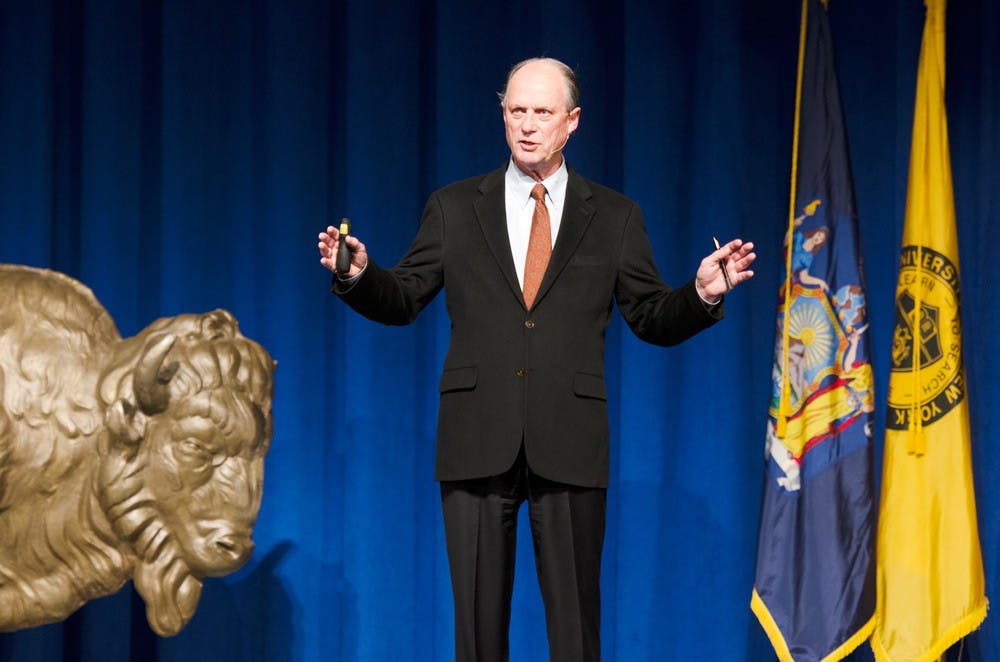When Dr. Robert Ballard was a child, his dream was to become Captain Nemo from the book 20,000 Leagues Under the Sea. Now, Ballard is a deep-sea oceanographer trying to inspire today’s youth.
And he’s doing it with an exploration vessel named after Captain Nemo’s fictional submarine, the E/V Nautilus.
Ballard, a professor of oceanography and director of the Center for Ocean Exploration at the University of Rhode Island, spoke at Alumni Arena Wednesday night in front of a crowd of more than 3,000 people as part of UB’s Distinguished Speaker Series.
This coming June, Ballard will be 73 years old. He’s been going to sea for 56 years and has mounted more than 150 deep-sea explorations. He discovered the RMS Titanic in 1985 during a mission with the United States Navy.
But for all he’s accomplished, Ballard’s talk Wednesday night focused more on the future than the past. That’s because despite discovering shipwrecks in oceans, seas and lakes around the globe, Ballard thinks he’s only just begun making his way through the archeological gold mine that lies beneath the waves.
The reproduction of planets, the chemistry of oceans, the mining of mineral deposits from hydrothermal vents, plate tectonics, harvesting the energy of the earth’s core, colonizing the oceans and even moving our spirit to the ocean floor are only a few of the themes Ballard touched on. His lecture emphasized the importance of mapping the high seas as he explained that 50 percent of the territory the United States owns is beneath the oceans.
“We have better maps of Mars than half the United States of America,” Ballard said excitedly to the crowd. “We’re committed to exploring our own country.”
Ballard said it’s important for the youth of the United States to be inspired at a young age – whether the inspiration is to explore the oceans or pursue their own dreams. The youth of today is a different species – they look like us but they’re not us; they live in the Cloud, Ballard said.
“Your spirit is indestructible and moves at the speed of light … and that’s what our kids are doing now,” Ballard said.
Ballard hopes the exploration vessel E/V Nautilus will allow today’s youth to experience the deep-sea themselves. Satellite technology video from the E/V Nautilus will be transmitted to online viewers as the underwater vessel travels from the Gulf of Mexico, through the Panama Canal and up toward Alaska.
The E/V Nautilus is owned and operated by the Ocean Exploration Trust, a non-profit organization that Ballard founded in 2008 that inspires young people through multiple programs for educators and students.
Ballard said the E/V Nautilus is going to make discoveries on the six-month journey it departed on a few days ago. He said the exploration is being led by “a corps” of exploration, which Ballard said is similar to Lewis and Clark, who he calls the "corps of discovery."
Ballard said he runs his ship like the emergency room of a hospital, and that when a discovery is made, he can deliver the expert to the point of discovery in 30 minutes.
“It always happens on Sunday morning at 2 in the morning,” Ballard said jokingly. “We will go into the universities of America and we will find the expert in this subject matter and beam their spirit to the bottom and have them take over the ship.”
Ballard’s discovery of the Titanic, RMS Lusitania, USS Yorktown and the German Battleship Bismarck gave him his fame.
The United States Navy used a cover story of looking for the Titanic so they could actually look for their nuclear-powered submarines the Thresher and Scorpion, which were sunk during the Cold War. Ballard was on the mission and wanted to find all three – and he did.
Ballard emphasized the importance of leaving the Titanic and its archeological treasures 12,000 feet below the surface. He described finding pairs of mothers’ and babies’ shoes all around and inside the sunken ship.
“When you see that you don’t pick up anything … You don’t go to Gettysburg with a shovel, you don’t do that,” Ballard said.
Ballard said trying to prevent future “pirates” from raiding the Titanic of its treasures became impossible because of its location in the ocean.
Although Ballard appreciates the discoveries of ships like the Titanic, he said the more important ones are the “fundamental discoveries” like hydrothermal vents and chemosynthetic organisms.
Ballard is looking forward to the future discoveries waiting for him at the bottoms of the oceans. And the kid who once wrote letters to oceanographers and dreamed of being Captain Nemo is now hoping to inspire today’s youth to make their own discoveries.
Charles W Schaab is an assistant news editor and can be reached at news@ubspectrum.com





